
“I think the training went great. You provided a lot of good information that we need.”
Fully accredited. Globally recognized. Built for the next generation of Addiction & Mental Health Professionals.




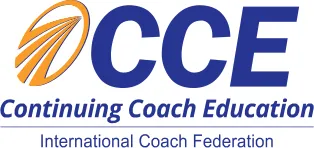




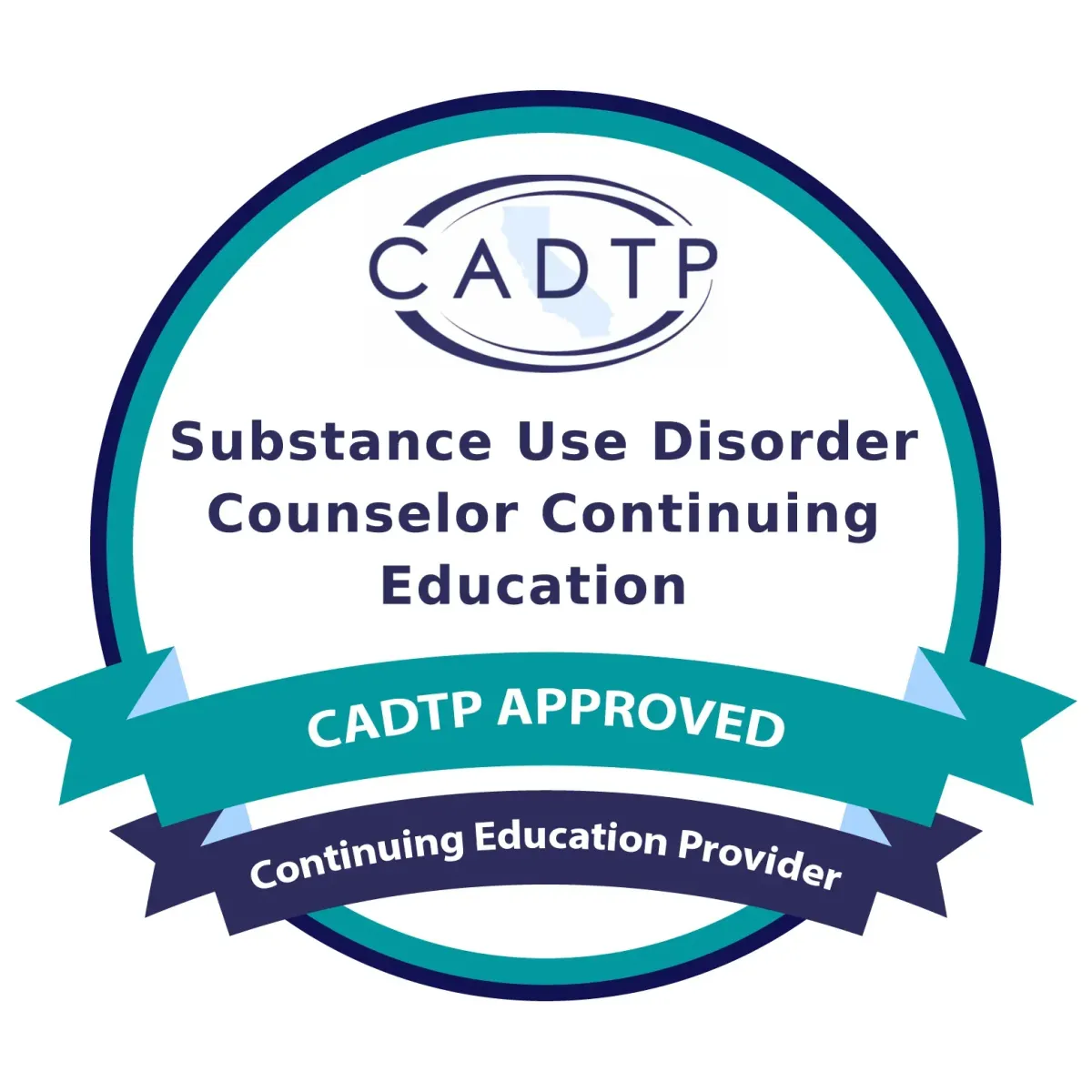


The Nationally Certified Recovery Coach™ (NCRC I & II) is a professional training and credentialing program that equips everyday people, coaches, and professionals to guide others through recovery from drug and alcohol addiction.
Recovery Coaching is a distinct field in the addiction and mental health world. It isn’t therapy, and it isn’t sponsorship. A Recovery Coach acts as a partner, motivator, and accountability guide—someone who helps clients create a vision for sobriety, navigate barriers, and stay on track with real-world support.
This program was built to raise the standard of recovery coaching worldwide. It combines two levels of training into one complete certification, aligned with international coaching competencies and backed by global accreditation. That means when you graduate, you don’t just have skills—you have a recognized credential that proves you’re trained, ethical, and credible.
In short, this program exists to professionalize recovery coaching, give you a seat at the table alongside treatment providers, and create more pathways for people struggling with addiction to find real help.


What a recovery coach is and isn’t
How to set boundaries and protect your energy
Building trust while holding clients accountable

Where coaching fits alongside therapy, rehab, and 12-step
Understanding abstinence, harm reduction, and MAT
Navigating treatment systems without losing your role

The “do’s and don’ts” that keep you safe
Contracts, confidentiality, and duty to warn
Knowing when to refer out (and why it matters)

How to spot where a client is on the change curve
Using Motivational Interviewing to move them forward
Turning ambivalence into action

Coaching criminal justice clients with structure and safety
Handling high-net-worth clients with entitlement issues
Adapting to unique needs: families, youth, and co-occurring challenges

How drugs hijack brain chemistry and behavior
Why cravings and relapse triggers happen (and how to coach through them)
Using life skills, stress management, and vision planning to build lasting recovery


Coach ethically and professionally within clear boundaries.
Use active listening and communication skills to engage clients.
Guide clients through relapse prevention and coping strategies.
Understand the addicted brain and how cravings, triggers, and relapse patterns work.
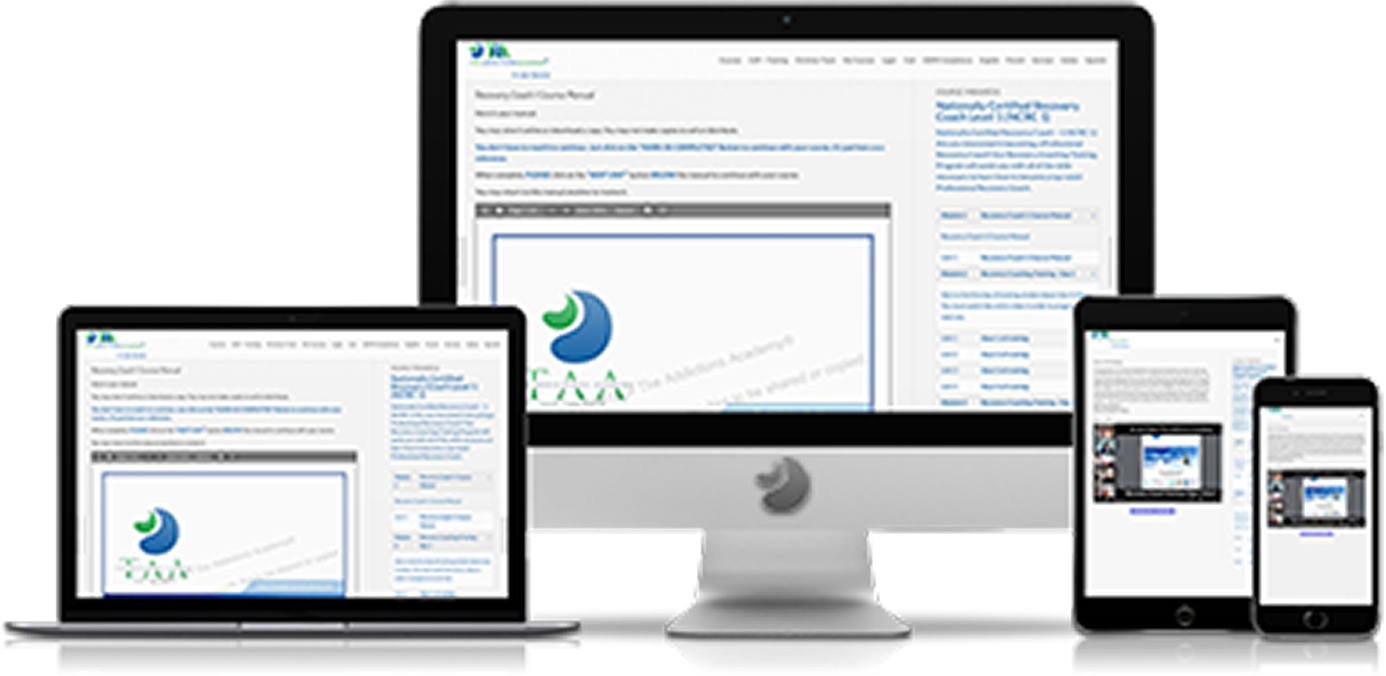


20 CEU/CME/CE/Hrs
Each course is designed to meet the global standards, with clear objectives, real-world application, and evidence-based frameworks.

Discover what recovery coaching is (and isn’t), why it fills a critical gap in treatment, and how to set ethical boundaries, build trust, and keep clients moving forward with real-world tools.

Learn the do’s and don’ts of professional coaching—from contracts and confidentiality to payment models, liability risks, and how to protect yourself legally in every interaction.

Master the intake process, screen clients effectively, and navigate personalities like narcissists, people-pleasers, or angry clients. Plus, get practical strategies for building life skills in early recovery.

Understand cravings and relapse risk, then coach clients through stress management, daily rituals, emotional coping strategies, and practical tools that break the relapse cycle before it starts.

Get up-to-date on prescription and synthetic drug trends, learn how to approach misuse with compassion and science, and use vision boards and goal-setting to create a future bigger than addiction.

Recognize 15+ psychological defense mechanisms in clients, hold firm boundaries, and coach with confidence while knowing when to refer out for therapy or higher-level care.

Apply your skills with hands-on exercises like food/mood journals, gratitude letters, and identity work. Tackle real client cases—detox planning, family enabling, sex addiction—while practicing scope and accountability.

Walk through complex case studies with high-risk clients. Learn exactly what coaches can and cannot do legally, and finish with clear exam prep and next steps for stepping into practice.

10 CEU/CME/CE/Hrs
A comprehensive digital reference guide that takes you beyond foundations into advanced, real-world recovery coaching. Use it to level up your scope, language, and decision-making in complex cases.

Breaks down the DSM-5 in plain English so you can understand what clinicians mean without stepping out of scope. You’ll learn how addiction and behavioral disorders are classified, what red flags to look for, and how to talk the same language as treatment professionals.

This chapter gives you a coach-level overview of common mental health issues you’ll encounter in the field, like anxiety, depression, psychosis, eating disorders, ADHD, and personality disorders. You’ll learn when coaching is appropriate, when to collaborate, and when to refer out.

Here you’ll master the cycle every client moves through—from denial to action to maintenance. You’ll learn how to spot what stage they’re in, adjust your coaching approach, and keep progress moving forward even when relapse happens.

Not every client fits the same mold. This chapter explores how to work effectively with high-risk and high-profile groups such as criminal justice clients, wealthy/entitled clients, and neurodiverse individuals. You’ll learn strategies to set boundaries, ensure safety, and adapt your coaching style.

You’ll get familiar with the medications most often prescribed in mental health and addiction recovery, including those used in Medication-Assisted Treatment. The goal isn’t to become a doctor—it’s to understand what your clients may be taking, what side effects look like, and how to stay within scope while supporting them.

This chapter explains how drugs and alcohol hijack brain chemistry, why cravings feel impossible to fight, and how relapse patterns form. You’ll learn practical ways to help clients manage triggers and start rewiring their habits through structure and accountability.

Every coach needs to know where the line is. This chapter covers what you can and cannot do legally, how to document without overstepping, and the ethical guidelines that keep you—and your clients—safe.

The manual closes with a set of practical tools you can use immediately in your practice—action plans, accountability contracts, stress check-ins, and reference glossaries. These give you quick, coach-ready resources for real client work.

6 CEU/CME/CE/Hrs
Gain a deep understanding of ethical responsibilities, including confidentiality, professional standards, report writing, case management, and legal compliance across state lines. Through practical scenarios, action planning, and guidance on boundaries, trust-building, and communication, participants learn to navigate complex ethical situations confidently.

Join 10 weeks of live group mentorship with a master coach to get personalized guidance, real-time feedback, and proven strategies for coaching. Collaborate with peers, ask questions, and apply new skills in a supportive, hands-on environment designed to accelerate your growth and confidence.

Like any respected accredited program, your training concludes with a comprehensive final examination designed to validate your mastery of the material. Passing this exam isn’t just a formality — it’s the moment you prove, both to yourself and to the field, that you are prepared to practice at the highest standard. Unlike most institutions, we don’t tack on hidden fees. Your exam, grading, and official certification are fully included in your tuition.

Enjoy 6 months of on-demand access to the full training, allowing you to learn at your own pace. Revisit lessons anytime, review key strategies, and reinforce your coaching skills whenever it fits your schedule.

Gain exclusive marketing seals and the right to use the NCRC I and NCRC II designation, showcasing your expertise and credibility as a Certified Recovery Coach. Enhance your professional profile, attract clients, and stand out in the coaching field.

Ready-to-use exercises and proven tools that make working with clients—or supporting loved ones in recovery—simpler, more structured, and more effective. It takes the guesswork out of what to do next and helps create real change instead of spinning in circles.

Be found by clients actively searching for addiction and mental health professionals.

Keep leveling up your credentials and skills—while paying a fraction of the cost.

Tap into a global network of certified professionals, mentors, and peers.

Nationally Certified Recovery Coach I & II
36 Combined CEUs
WEEKLY LIVE CALLS
Expert Led
10 Weeks Of Mentorship
Move At Your Own Speed
Self Paced
With 6mo To Complete
BACK TO SCHOOL SPECIAL
$999
Regular Pricing $1997
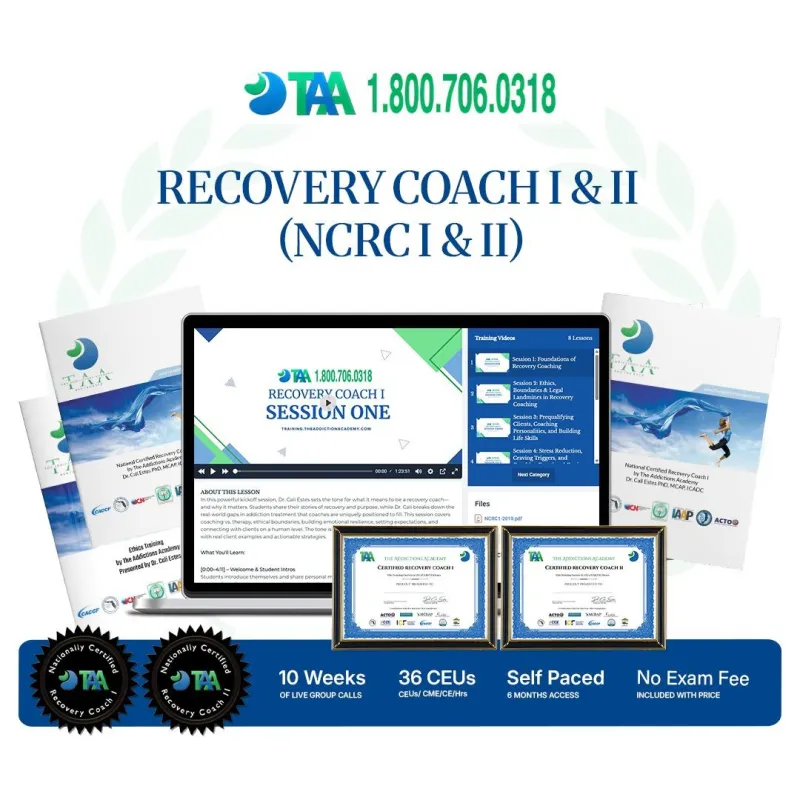

Recovery Coach I & II
$999.00
$5997.0083% offQuantity

Dr. Cali Estes is a world leader in addiction recovery, mental health, and performance coaching—known globally as “The Female Dr. Drew” and “The Battery Recharger.” With over 25 years of experience, she’s helped CEOs, celebrities, athletes, and high-achievers break free from burnout, addiction, and trauma using her no-nonsense, science-backed, results-driven approach.
As founder of The Addictions Academy and Sober On Demand®, Dr. Cali has trained more than 60,000 professionals across 40 countries and created concierge recovery programs trusted by leaders who need change fast. A 6x #1 best-selling author, international speaker, and host of the UnPause Your Life podcast, her work has been featured by CNN, Forbes, People, and FOX.
When you learn from Dr. Cali, you’re learning from someone who has walked through the fire, mastered the tools, and built programs that actually work. She won’t just give you knowledge—she’ll show you how to create transformation that lasts.

A recovery coach, also known as a sober coach is a generic term that covers many different roles. A recovery coach provides invaluable support for people who are struggling through their compulsive, obsessive and destructive behaviors fueled by the cycle of addiction.
Yes. Many treatment centers now rely on recovery coaches as part of their client support teams. This certification gives you recognized training, practical coaching tools, and ethical guidelines that complement clinical work. It can strengthen your role, expand your responsibilities, and make you more marketable within the field.
Recovery coaching is different. Therapists look backward, sponsors focus on 12-step work, but coaches meet clients in the here-and-now and move them forward. A coach provides structure, accountability, and real-world strategies for building a life in recovery. For many people, that action-based support is exactly what’s missing from traditional treatment or peer sponsorship.
No. There are no prerequisites to enroll in this certification. You don’t need a degree or a professional license—just the desire to learn and the commitment to help others. This program is designed to equip anyone, from lived-experience peers to seasoned professionals, with the tools and credibility to coach effectively.
The salary of a recovery coach will depend on this state that they are in and if they are currently working for a treatment center or they are in private practice. Usually working for a treatment center can range between 15 and $25 per hour for a recovery coach. Coaches that are hired by the state that are going into hospitals and placing people in treatment generally make $75-$100 per hour. Recovery coaches in private practice can charge anywhere from $125-$350 per hour.
Most students complete the training and earn their certification in 8 to 10 weeks. You’ll have access to on-demand video modules, plus 10 weeks of live mentorship, so you can move at your own pace with expert guidance along the way.
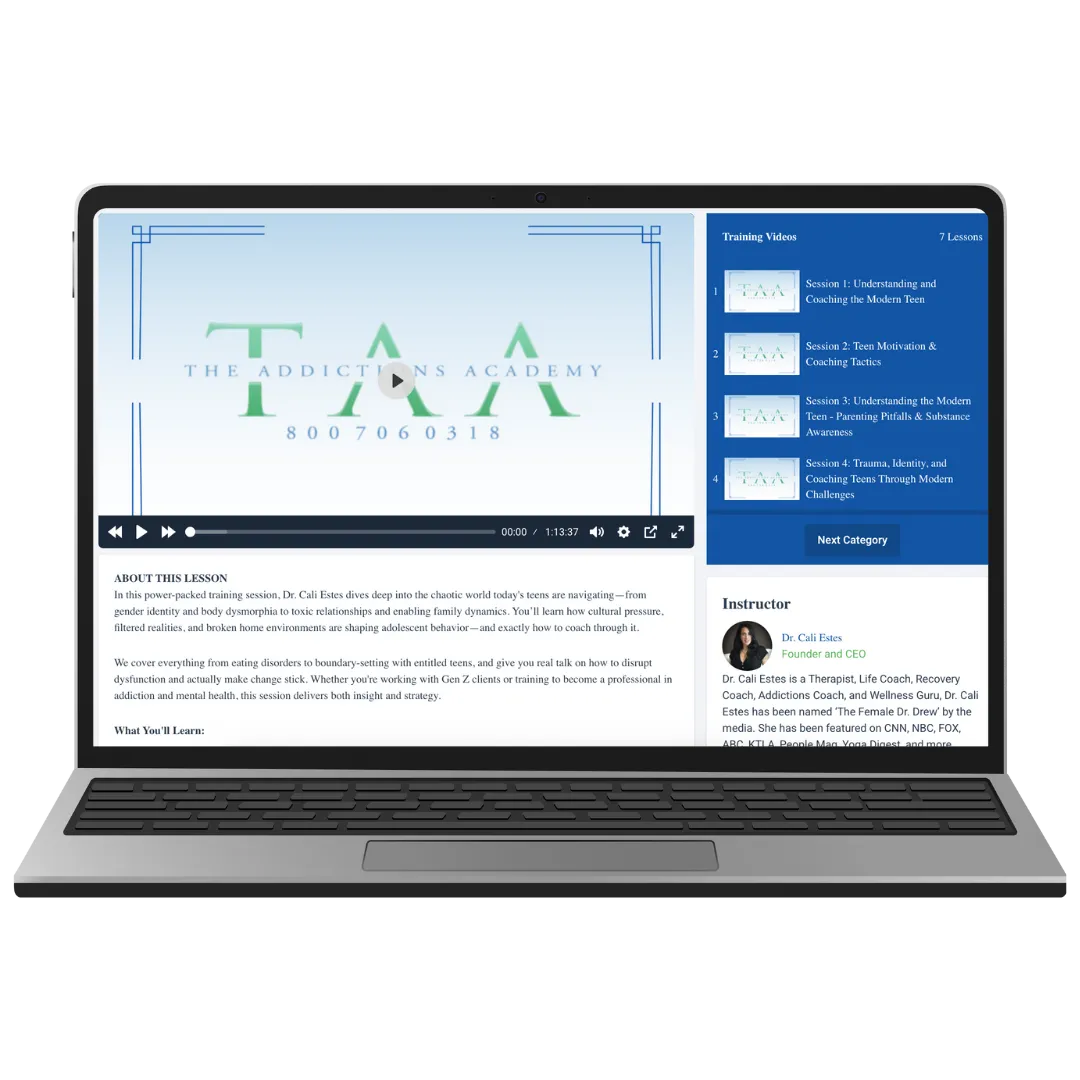
assist clients with Substance Use Disorders in finding the appropriate path to sobriety
No application or pre-requisites needed for our certifications. Start your journey with us today!
No application or pre-requisites needed for our certifications. Start your journey with us today!
$999
Next Live Group Coaching Call Starts Tuesday, September 30th. Self Study Videos Available Immediately Upon Registration
This Program Earns You A Nationally Recognized and Accredited Certification In Recovery Coaching
10 Weeks
OF LIVE GROUP CALLS
36 CEUs
CEUs/CME/CE/Hrs
Self Paced
6 MONTHS ACCESS
No Exam Fee
INCLUDED WITH PRICE

The World’s Premier Training Institute for Mental Health & Addiction Professional Development.
2046 Treasure Coast Pkwy Unit A, #207 Vero Beach FL 32960